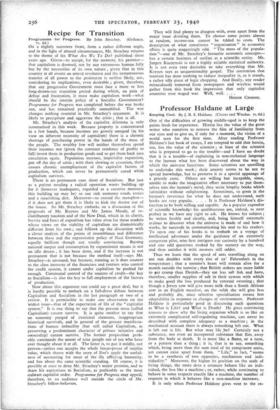Recipe for Transition
ON a slightly narrower front, from a rather different angle, and in the light of altered circumstances, Mr. Strachey returns to the theme of his What Are We To Do? published three years ago. Given—to accept, for the moment, his premise— that capitalism is doomed, not by any extraneous human folly but by the necessities of its own nature , given that in this country at all events an armed revolution and the instantaneous transfer of all power to the proletariat is neither likely, nor, considering its implications, even desirable ; given, therefore, that any progressive Government must face a more or less long-drawn-out transition period during which, on pain of defeat and frustration, it must make capitalism work—what should be the interim policy of a Socialist Government? Programme for Progress was completed before the war broke out, and has remained practically unmodified. The war changes nothing essential in Mr. Strachey's argument. It is likely to precipitate and aggravate the crisis ; that is all.
Mr. Strachey's analysis of the capitalist dilemma is only summarised in this work. Because property is concentrated in a few hands, because incomes are grossly unequal (in his view an inherent necessity of capitalism) there is a chronic shortage of purchasing power in the hands of the mass of the people. The wealthy few will neither themselves spend their incomes nor (given the constant tendency of profits to fall) invest them in production goods and so get them back into circulation again. Population increase, imperialist expansion, put off the day of crisis ; with their slowing or cessation, there ensues chronic unemployment of the capitalist factors of production, which can never be permanently cured while capitalism survives.
There is no permanent cure short of Socialism. But just as a patient needing a radical operation wants building up for it (however inadequate, regarded as a curative measure, this building up may be) so our sick economy needs tonics and a nourishing diet. Moreover—to extend the metaphor— if it does not get them it is likely to kick the doctor out of the house. So Mr. Strachey embarks on a discussion of the proposals of Mr. Keynes and Mr. James Meade, of re- distributory taxation and of the New Deal, which in its clarity, brevity and force of exposition has value even for those readers whose views on the viability of capitalism are diametrically different from his own ; and follows up the discussion with a clever analysis of the points of resemblance and difference between these and the expansionist policy of Nazi Germany, equally brilliant though not wholly convincing. Raising national output and consumption by expansionist means is not an idle dream , it has been done, and if the increase is not permanent that is not because the method itself—says Mr. Strachey—is unsound, but because, running as it does counter to the class interests of the financiers and rentiers who control the credit system, it cannot under capitalism be pushed far enough. Communal control of the sources of credit—the key to Socialism—is also the key to full employment of the factors of production.
Now about this argument one could say a great deal, but it is hardly possible to embark on a full-dress debate between Capitalism and Socialism in the last paragraph or two of a review. It is permissible to make one observation on the widest issue—that of the expectation of life of the " capitalist system." It is one thing to say that the present mess (called Capitalism) cannot survive. It is quite another to say that an economy purged of irrational elements, inappropriate historical survivals, and in general of the grosser manifesta- tions of human imbecility (but still called Capitalism, as preserving a predominant character of private initiative and ownership) cannot survive. The former proposition prob- ably commands the assent of nine people out of ten who have ever thought about it at all. The latter is, to put it mildly, not proven—unless one accepts the whole hocus-pocus of surplus value, which shares with the story of Eve's apple the useful- ness of accounting for most of the ills afflicting humanity, and has about the same scientific standing. Of course, it is possible at once to deny Mr. Strachey's major premise, and to share his aspirations to Socialism, as preferable to the most stalwart capitalist order. Programme for Progress may appeal, therefore, to an audience well outside the circle of Mr. Strachey's fellow-believers. They will find plenty to disagree with, even apart from the major issue dividing them. To choose some points almost at random, income-tax cannot be tdded to costs. The description of what constitutes " organisation " in economic affairs is quite staggeringly odd. " The mass of the popula- tion "—one of Mr. Strachey's favourite economic concepts— has a certain haziness of outline as a scientific entity. Mr. Jurgen Kuczynski is not a highly reliable statistical authority. It is not even very desirable to take everything that Mr. Keynes says as unquestionably gospel. The contention that taxation has done nothing to reduce inequality is, as it stands, a rather silly piece of logic chopping. And finally, any reader miraculously removed from newspapers and wireless would gather from this book the impression that only capitalist countries ever waged war. Well, well. . . .
HONOR CROOME.






































 Previous page
Previous page